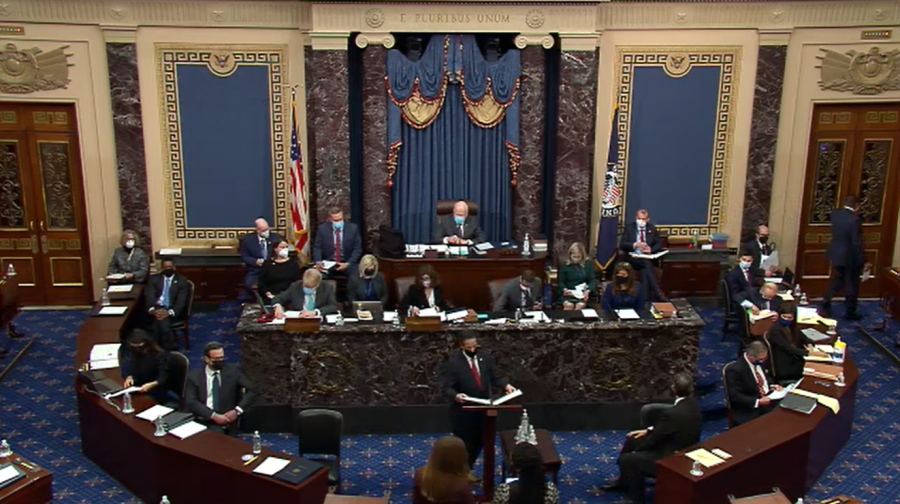Impeached Twice, Acquitted Twice: Trump Saved By Loyal Republicans
Patrick Leahy, the President Pro Tempore, presides over the second Impeachment trial of Former President Donald Trump. Trump was acquitted once again with 43 Senators not voting for a conviction.
February 21, 2021
Former President Donald Trump was impeached once during his presidency on Dec. 18, 2019, but was not convicted by the Senate, which held a Republican majority at the time. Making history, he was impeached a second time on Jan. 13, 2021, while the Senate impeachment trial was held from Tuesday, Feb. 9 to Saturday, Feb. 13.
The articles for Trump’s first impeachment included abuse of power and obstruction of justice for the call to Ukraine to investigate his 2020 political opponent, now-President Joseph R. Biden. Now, the singular article for his second impeachment is incitement of insurrection, purely motivated behind the Jan. 6, 2021, Capitol raid.
Some Senators have already made up their minds regarding the impeachment trial, which translates to some Americans’ views on the trial as well. Senior Aaryan Somadder said, “I believe that Donald Trump’s impeachment trial should continue as he has violated multiple legal and ethical responsibilities of being president. In light of the recent insurrection terrorist event at the Capitol, I full-heartedly believe that he should be tried accordingly.”
However, others believe that this trial has no purpose being held now. Junior Caden Quinn thinks that “it’s useless. Don’t start Biden’s term with past events. A new election is supposed to mean new rules and regulations, not still shaming the old ones.
On the first day of the second impeachment trial, both the prosecution and the defense gave their opening statements, which were followed by a three-day-long prosecution argument as to why Trump should be convicted for his part in inciting the events that took place on January 6th at the Capitol. In summary, the prosecution linked Trump’s words after the election results and on the day of the Capitol riot to the events by using videos that showed his speech on that day fueling anger in his audience, translating to their later actions on Capitol grounds.
According to CNBC, “the impeachment managers argued that Trump had mobilized extremist groups and cultivated a culture of violence over months and years, laying the groundwork for an insurrection by his supporters which culminated in the worst attack on the Capitol since the War of 1812.”
The prosecution was able to convince or cement the beliefs of some that Donald Trump should be ruled guilty of incitement of insurrection. Junior Cameron Salehi said, “As Former President Trump came closer to the end of his term, I discerned that he did not grasp the seriousness of his responsibility to represent the nation. Proving him innocent is most likely an arduous task considering his entire legal already quit the trial and he is a difficult person to work with. I believe Trump should own up to his actions of failing to represent the nation. His legal team is already having trouble defending him as a result of all the damning evidence linking him to the Capitol riot.”
The prosecution closed their argument saying that conviction was necessary to preserve democracy and if he remains unconvicted, “it sets a new terrible standard for presidential misconduct.” While this side’s argument was convincing for some Republicans, others hardly even listened to the prosecution. “While a handful of Republican senators may break from the former president, others seemed to go out of their way on Thursday to express impatience with the trial,” an article on Washington Post states.
That is exactly what happened. On Saturday, Feb. 13, Trump was once again acquitted; 57 voted to convict while 43 voted the opposite. In order to convict, the Senate needs a ⅔ majority, which was not achieved. Democrats needed 17 Republicans to vote in favor of conviction, but was only able to convince 7 of them, and therefore could not reach the ⅔ majority.



